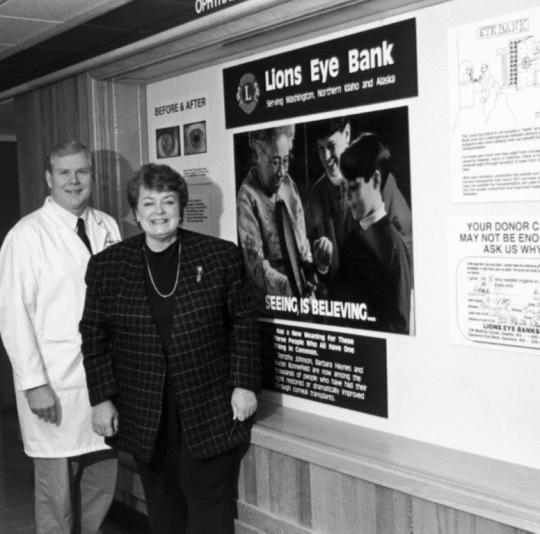
University-Ballard Lions Club celebrates 100 years of service
The University-Ballard Lions Club will celebrate its centennial with a gala luncheon on June 6. The UW Department of Ophthalmology will be a presenting sponsor for the event.
The Lions’ support for vision research is legendary; since 1925 when Helen Keller asked the members of Lions Clubs International to become her “Knights of the Blind.” Since then, hundreds of millions of lives have been changed through the vision-related work of Lions around the world, and today, the worldwide association is as dedicated as ever to hastening the day when no one should suffer unnecessarily from vision problems. Through eye centers and hospitals, medicines and surgeries, eyeglasses, and eye banks, Lions are working to end preventable blindness and aid the visually impaired.
The University Lions Club, which has merged with the Ballard Lions Club, began its support for the UW Department of Ophthalmology by creating the Lions Eye Bank more than 50 years ago. Rebranded in the 2000’s as SightLife, this eye bank has grown into one of the world’s largest, providing corneal tissue for surgeons throughout the US and throughout the world.
“The Lions supported the Eye Bank, which provided corneal tissue for many transplants,” said Donna Oiland, who became its director in 1972. “So many people had their vision restored, and it is amazing how this all came about with the partnership between Lions and the UW.”
Dr. Fred Minifie recalled how the relationship between Lions and the Department grew over the 27 years Dr. Robert Kalina was chair and has continued to grow during Dr. Russell Van Gelder‘s 17 years as chair of the Department of Ophthalmology.
“Bob Kalina had such a large influence in the early development of the Lions Eye Bank as its medical director. Ultimately, the Eye Bank grew and became too large to remain in the Department. When Bucey Chair Dr. Russ Van Gelder arrived in Seattle, he was instrumental in developing several linkages to Seattle-area Lions Clubs,” said Minifie, who would later chair the UW Medicine Eye Institute Community Action Board.
When Siddall Chair Tueng Shen, MD, PhD, came to UW in the early 2000s, the University Lions Foundation supported her research with a grant. She held the title of the Northwest Lions Professor of Ophthalmology for several years until she received her current endowed chair position. Minifie recalled Dr. Shen's research on developing artificial corneas, including going to her native China and implanting them in patients there. The University-Ballard Lions Club “has been truly proud to support Dr. Shen’s work over these many years,” he said.
In recent years, the Lions have presented an annual Helen Keller Award to a researcher at the annual Gained in Translation conference. Gained in Translation is a meeting of clinicians and vision scientists from the University of Washington, the University of British Columbia, and Oregon Health Sciences University. Presentations focus on bridging the gap between disease treatment and the latest translational and basic research advances.
The Lions Gift of Sight program through the Department provides used eyeglasses to patients who may not be able to afford them and helps with the cost of scleral lenses for cornea patients. To donate to this fund, visit give.uwmedicine.org.
